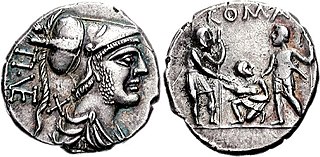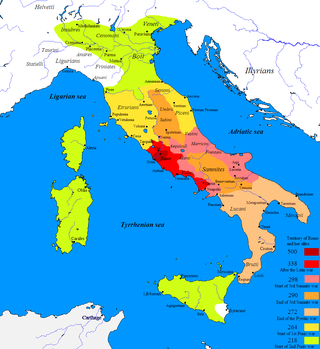Related Research Articles

The gens Furia,originally written Fusia,and sometimes found as Fouria on coins,was one of the most ancient and noble patrician houses at Rome. Its members held the highest offices of the state throughout the period of the Roman Republic. The first of the Furii to attain the consulship was Sextus Furius in 488 BC.

In ancient Roman religion,the Flamen Martialis was the high priest of the official state cult of Mars,the god of war. He was one of the flamines maiores,the three high priests who were the most important of the fifteen flamens. The Flamen Martialis would have led public rites on the days sacred to Mars. Among his duties was the ritual brandishing of the sacred spears of Mars when the Roman army was preparing for war.
The gens Papiria was a patrician family at ancient Rome. According to tradition,the Papirii had already achieved prominence in the time of the kings,and the first Rex Sacrorum and Pontifex Maximus of the Republic were members of this gens. Lucius Papirius Mugillanus was the first of the Papirii to obtain the consulship in 444 BC. The patrician members of the family regularly occupied the highest offices of the Roman state down to the time of the Punic Wars. Their most famous member was Lucius Papirius Cursor,five times consul between 326 and 313 BC,who earned three triumphs during the Samnite Wars. Most of the Papirii who held office under the later Republic belonged to various plebeian branches of the family. Although the most illustrious Papirii flourished in the time of the Republic,a number of the family continued to hold high office during the first two centuries of the Empire.

Lucius Papirius Cursor was a celebrated politician and general of the early Roman Republic,who was five times consul,three times magister equitum,and twice dictator. He was the most important Roman commander during the Second Samnite War,during which he received three triumphs.

The gens Quinctia,sometimes written Quintia,was a patrician family at ancient Rome. Throughout the history of the Republic,its members often held the highest offices of the state,and it produced some men of importance even during the imperial period. For the first forty years after the expulsion of the kings the Quinctii are not mentioned,and the first of the gens who obtained the consulship was Titus Quinctius Capitolinus Barbatus in 471 BC;but from that year their name constantly appears in the Fasti consulares.
Gaius Maenius was a Roman statesman and general who was elected consul in 338 BC and appointed dictator twice,in 320 BC and 314 BC.

The gens Cornelia was one of the greatest patrician houses at ancient Rome. For more than seven hundred years,from the early decades of the Republic to the third century AD,the Cornelii produced more eminent statesmen and generals than any other gens. At least seventy-five consuls under the Republic were members of this family,beginning with Servius Cornelius Maluginensis in 485 BC. Together with the Aemilii,Claudii,Fabii,Manlii,and Valerii,the Cornelii were almost certainly numbered among the gentes maiores,the most important and powerful families of Rome,who for centuries dominated the Republican magistracies. All of the major branches of the Cornelian gens were patrician,but there were also plebeian Cornelii,at least some of whom were descended from freedmen.
Publius Licinius Crassus Dives was consul in 205 BC with Scipio Africanus;he was also Pontifex Maximus since 213 or 212 BC,and held several other important positions. Licinius Crassus is mentioned several times in Livy's Histories. He is first mentioned in connection with his surprising election as Pontifex Maximus,and then several times since in various other capacities.
Manius Pomponius Matho was a Roman general who was elected consul for the year 233 BC with Quintus Fabius Maximus Verrucosus. He was also the maternal grandfather of the general and statesman Scipio Africanus.

Quintus Caecilius Metellus was a pontiff in 216 BC,aedile of the plebeians in 209 BC,curule aedile in 208 BC,magister equitum in 207 BC,consul in 206 BC,dictator in 205 BC,proconsul of Bruttium in 204 BC,and an ambassador at the court of Philip V of Macedon in 185 BC.

The gens Postumia was a noble patrician family at ancient Rome. Throughout the history of the Republic,the Postumii frequently occupied the chief magistracies of the Roman state,beginning with Publius Postumius Tubertus,consul in 505 BC,the fifth year of the Republic. Although like much of the old Roman aristocracy,the Postumii faded for a time into obscurity under the Empire,individuals bearing the name of Postumius again filled a number of important offices from the second century AD to the end of the Western Empire.

The gens Veturia,originally Vetusia,was an ancient patrician family of the Roman Republic. According to tradition,the armourer Mamurius Veturius lived in the time of Numa Pompilius,and made the sacred ancilia. The Veturii occur regularly in the Fasti Consulares of the early Republic,with Gaius Veturius Geminus Cicurinus holding the consulship in 499 BC. Like other old patrician gentes,the Veturii also developed plebeian branches. The family declined in the later Republic,with the last consular Veturius holding office in 206 BC,during the Second Punic War.
Gaius Junius Bubulcus Brutus was a Roman general and statesman,he was elected consul of the Roman Republic thrice,he was also appointed dictator or magister equitum thrice,and censor in 307 BC. In 311,he made a vow to the goddess Salus that he went on to fulfill,becoming the first plebeian to build a temple. The temple was one of the first dedicated to an abstract deity,and Junius was one of the first generals to vow a temple and then oversee its establishment through the construction and dedication process.
Titus Veturius Geminus Cicurinus was a Roman Republican patrician politician and general of the gens Veturia. He served as a Roman consul in 494 BC together with Aulus Verginius Tricostus Caeliomontanus.
Marcus Geganius Macerinus was a Roman statesman who served as Consul in 447,443,and 437 BC,and as Censor in 435 BC.
Titus Veturius Geminus Cicurinus was a Roman politician of the 5th century BC,consul in 462 BC and maybe decemvir in 451 BC.

Quintus Publilius Philo was a Roman politician who lived during the 4th century BC. His birth date is not provided by extant sources,however,a reasonable estimate is about 365 BC,since he first became consul in 339 BC at a time when consuls could be elected in their twenties. His Greek cognomen ‘Philo’was unique to his family.
The gens Publilia,sometimes written Poblilia,was a plebeian family at ancient Rome. Members of this gens are first mentioned in the early decades of the Republic. The lex Publilia passed by Volero Publilius,tribune of the plebs in 471 BC,was an important milestone in the struggle between the patrician and plebeian orders. Although the Publilii appear throughout the history of the Republic,the family faded into obscurity around the time of the Samnite Wars,and never again achieved positions of prominence in the Roman state.

Aulus Manlius Torquatus Atticus was a politician during the Roman Republic. Born into the prominent patrician family of the Manlii Torquati,he had a distinguished career,becoming censor in 247 BC,then twice consul in 244 and 241 BC,and possibly princeps senatus in 220 BC. Despite these prestigious magistracies,little is known about his life. He was a commander who served during the First Punic War,and might have pushed for the continuation of the war even after Carthage had sued for peace following the Roman victory at the Aegate Islands in 241 BC. The same year,he suppressed the revolt of the Faliscans in central Italy,for which he was awarded a triumph. At this occasion,he may have introduced the cult of Juno Curitis at Rome.
Lucius Veturius Philo was a curule aedile in 210 BC,praetor of Cisalpine Gaul in 209 BC,propraetor of the same province in 208 BC,consular legate in 207 BC,consul in 206 BC,and magister equitum in 205 BC. He was renowned for having been the first to announce to the Roman Senate the news of the great victory won over Hannibal Barca at the Battle of Zama,which ended the Second Punic War.
References
- ↑ Livy (2006). Ab Urbe Condita Libri . Oxford: Oxford University Press. p. 103.
- ↑ Kaplan, Arthur (1977). Dictatorships and ultimate decrees in the early Roman Republic, 501-202 B.C. Studies in classical civilization. New York: Revisionist Press. p. 123. ISBN 978-0-87700-251-2.
- ↑ Livy, 27.6
- ↑ Livy, 27.10
- ↑ "Fasti Capitolini (1) - translation". www.attalus.org. Retrieved 2021-04-15.
- ↑ Livy. From the Founding of the City.